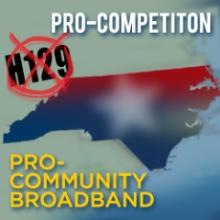Natural Monopoly in North Carolina: The Need for Community Networks and Competition
As the North Carolina Legislature considers HB129 and S87 to greatly limit community broadband networks (we analyzed the bill here), it is worth taking a step back to understand why companies like Time Warner Cable provide broadband that is unreliable and comparatively both slow and costly without having other companies come in to offer a better product. The problem is basic economics: the problem of natural monopoly. Ever wonder why you generally don't have a choice between two major operators like Comcast and Time Warner Cable? They have carved up the market due to the costs and difficulty of directly competing with one another. Some folks have a choice of cable companies -- RCN and Knology, for instance, have been successful overbuilders in a few regions (though they went through troubles far worse than most public networks that have been termed "failures"). But for the most part, overbuilding an incumbent cable company is all but impossible -- especially for a private sector company looking for a solid return on investment inside a few years. In the face of a new cable entrant, massive companies like TWC start lowering prices, offering cash or other enticements, and lock both residents and businesses into contracts to deny the entrant any subscribers. Companies like TWC can do this because they have lower costs (through volume discounts for gear, content, and even marketing synergies as well as because they long ago amortized the network construction costs) and can take losses in one community that are cross-subsidized by profits from non-competitive areas. New entrants, both private and public, have higher costs as well as a learning curve.







